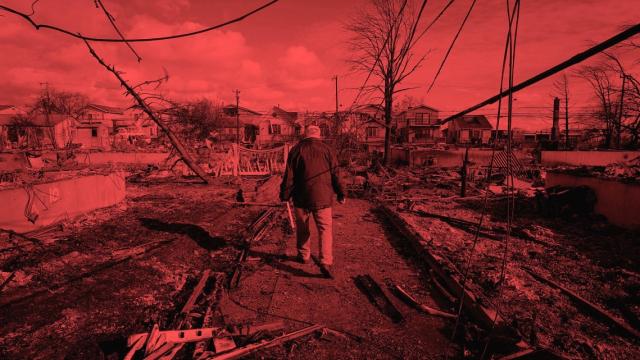
In the days after Superstorm Sandy, relief organizations were overwhelmed by the chaos and enormous need. One group quickly emerged as a bright spot. While victims in New York's hardest hit neighborhoods were stuck in the cold and dark, volunteers from the spontaneously formed Occupy Sandy became a widely praised lifeline.
Occupy Sandy was "one of the leading humanitarian groups providing relief to survivors across New York City and New Jersey," as a government-commissioned study put it.
Yet the Red Cross, which was bungling its own aid efforts after the storm, made a decision that further hampered relief: Senior officials told staffers not to work with Occupy Sandy.
Red Cross officials had no concerns about Occupy Sandy's effectiveness. Rather, they were worried about the group's connections to the Occupy Wall Street protest movement.
Three Red Cross responders told ProPublica there was a ban. "We were told not to interact with Occupy," says one. While the Red Cross often didn't know where to send food, Occupy Sandy "had what we didn't: minute-by-minute information," another volunteer says.
The three spoke to ProPublica on the condition of anonymity because they continue to work with the Red Cross. One says the direction came from an official based in Red Cross headquarters in Washington. Another understood the direction came from Washington. A third was not sure who gave the instructions.
The government-sponsored study that praised Occupy Sandy – written in 2013 for the Department of Homeland Security – also cites a prohibition: A Red Cross chief of volunteer coordination recalled that "he was told not to work with Occupy Sandy because of the affiliation with [Occupy Wall Street]," the study says.
Fred Leahy, a veteran Red Cross responder who was a Community Partnerships Manager in Sandy's aftermath, recalled a meeting a week after the storm in which he and two other officials, one from Washington, discussed "the political and donor ramifications of associating with Occupy Sandy due to its outgrowth from Occupy Wall Street." He says the meeting was called after an inquiry from Red Cross CEO Gail McGovern.
"Occupy Wall Street was not very favorably received by the political people in the city," Leahy says. Major Red Cross donors were from the same elite political circles "and they didn't understand Occupy Wall Street."
Red Cross responders says that many staffers and volunteers objected to the charity's stance on Occupy Sandy because among the Red Cross' fundamental principles is that aid must be delivered without regard to politics or ideology. "We are a neutral, humanitarian organization," one staffer says. "We don't take sides."
Leahy says Red Cross officials decided at the meeting to wait for Occupy Sandy representatives to come to them, rather than to approach the group. When a subordinate inquired about working with Occupy, Leahy says he told the person: "We really don't need to worry about them at this time. Because we've got more important concerns at the moment."
Nevertheless, Leahy denied there was a explicit injunction not to work with Occupy Sandy.
The Red Cross said in a statement that "there was never at any time a policy prohibiting Red Cross staff or volunteers from working with Occupy Sandy."
"We linked them with partners," the charity wrote. "We provided them with meals and other supplies – to the point of providing them with an entire warehouse full of material in March 2013."
But Occupy Sandy organizers interviewed by ProPublica say the Red Cross did not take their calls in the early days and weeks after the storm hit in October 2012. Nathan Kleinman, an Occupy Sandy organizer, recalls a Red Cross employee telling him that "they couldn't be seen working with us." He says some Red Cross responders attempted to help Occupy behind the scenes with advice and occasionally supplies.
"I have no doubt we could have had a much more productive relationship with the Red Cross if they'd been willing to associate themselves with us out in the open," Kleinman says. "I have no doubt their failure to look past politics hurt the overall recovery."
Workers inside the Red Cross' Manhattan headquarters say they were furious with the delay, which hampered the ability to provide aid.
Indeed, some Red Cross responders were so troubled, they tried to work with people from Occupy covertly. They say they maintained a spreadsheet of Occupy contacts separate from the other contact lists to hide from senior Red Cross officials that they were working with the group.
Contemporaneous Occupy Sandy meeting minutes show some examples of fruitful cooperation. An Occupy Sandy volunteer described the Red Cross as being "our lifeline in terms of hot meals."
The minutes also record an incident in which two Red Cross employees showed up at an Occupy site in Brooklyn "asking if we could send them volunteers – and their stipulations for that: they couldn't wear any Occupy stuff." Those conditions were rejected.
The Red Cross responders who say there was a clear ban on working with Occupy differ on how long it was in place. One person says the policy was rescinded in a matter of days, but that it took weeks to communicate to all the corners of the Red Cross relief effort.
A third Red Cross worker says that the policy was still in place in December, more than a month into the relief effort.
3 WAYS TO SHOW YOUR SUPPORT
- Log in to post comments











